BARA, Pakistan: Atop a police outpost in northwest Pakistan, Faizanullah Khan stands behind a stack of sandbags and peers through the sight of an anti-aircraft gun, scanning the terrain along the unofficial boundary with the country's restive former tribal areas.
On this cold and rainy February morning, he was looking not for aircraft but for fighters behind attacks against his force, the Khyber-Pakhtunkhwa provincial police.
It was daytime, so he could relax a bit, said Khan, an assistant sub-inspector, as he sat down on a traditional woven bed. But night was a different story, he said, pointing to pock marks left by bullets fired at the outpost, named Manzoor Shaheed, or Manzoor the Martyr, after a colleague felled by insurgents years ago.
The outpost is one of dozens that provide defence against militants waging a fresh assault on Pakistan's police from hideouts in the border region adjoining Taliban-controlled Afghanistan. The area, part of Khyber-Pakhtunkhwa province, is a hotbed for fighters of the Tehreek-e-Taliban Pakistan (TTP), an umbrella organisation of militant groups.
The threat the insurgency poses to nuclear-armed Pakistan was illustrated last month when the bombing of a mosque in Peshawar killed more than 80 police personnel. A faction of the TTP, Jamat-ul-Ahrar, claimed responsibility.
Visiting northwest Pakistan this month, Reuters gained access to police outposts and spoke to more than a dozen people, including senior police officials, many of whom described how the force is suffering increasing losses as it bears the brunt of insurgent attacks while contending with resourcing and logistical constraints.
Pakistani officials acknowledge these challenges but say they are trying to improve the force's capability amid adverse economic circumstances.
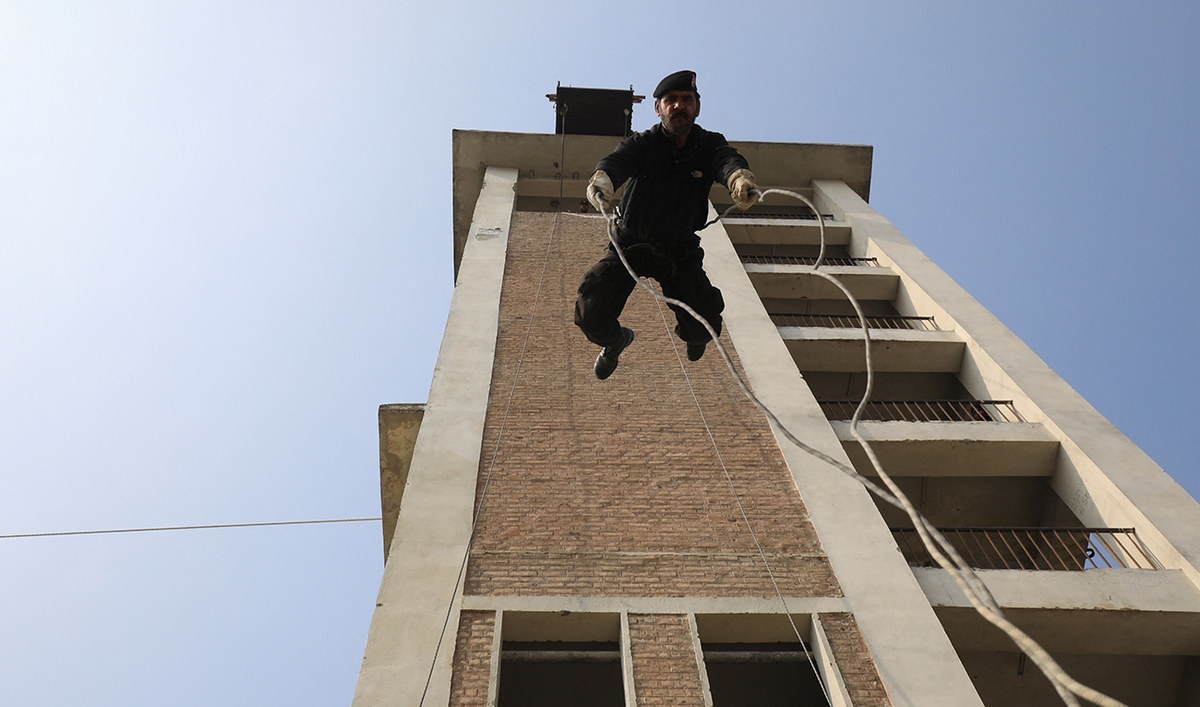
A police officer rappels off a building during a practice session at the Elite Police Training Centre in Nowshera, Pakistan, February 10, 2023. (Photo courtesy: REUTERS)
'Stopped their way'
Police here have fought militants for years -- more than 2,100 personnel have been killed and 7,000 injured since 2001 -- but never have they been the focus of militants' operations as they are today.
"We've stopped their way to Peshawar," assistant sub-inspector Jameel Shah of Sarband station, which controls the Manzoor Shaheed outpost, said of the militants.
Sarband and its eight outposts have suffered four major attacks in recent months and faced sniper fire with unprecedented frequency, according to police based there.
Killings of police in Khyber-Pakhtunkhwa rose to 119 last year, from 54 in 2021 and 21 in 2020. Some 102 have been slain already this year, most in the mosque bombing but some in other attacks. Elsewhere, militants stormed a police office in Karachi on Feb. 17, killing four before security forces retook the premises and killed three assailants.
The TTP, known as the Pakistani Taliban, pledges allegiance to the Afghan Taliban but is not directly a part of the group that rules in Kabul. Its stated aim is to impose Islamic religious law in Pakistan.
A TTP spokesman, Muhammad Khurasani, told Reuters its main target was Pakistan's military, but the police were standing in the way.
"The police have been told many times not to obstruct our way, and instead of paying heed to this the police have started martyring our comrades," he said. "This is why we are targeting them."
The military has conducted operations alongside the Khyber-Pakhtunkhwa police and faced TTP attacks, with one soldier confirmed dead in the province this year, according to data released by the military's public relations wing, which did not address questions from Reuters about military casualties.
In December, the TTP released a video purportedly recorded by one of its fighters from mountains around the capital, Islamabad, showing Pakistan's parliament building. "We are coming," said a note held by the unidentified fighter.
The TTP wants to show that its fighters can strike outside their current areas of influence, said Amir Rana, director of the Pak Institute for Peace Studies, an Islamabad-based think tank. While their ability may be limited, he said, "propaganda is a big part of this war and the TTP are getting good at it".
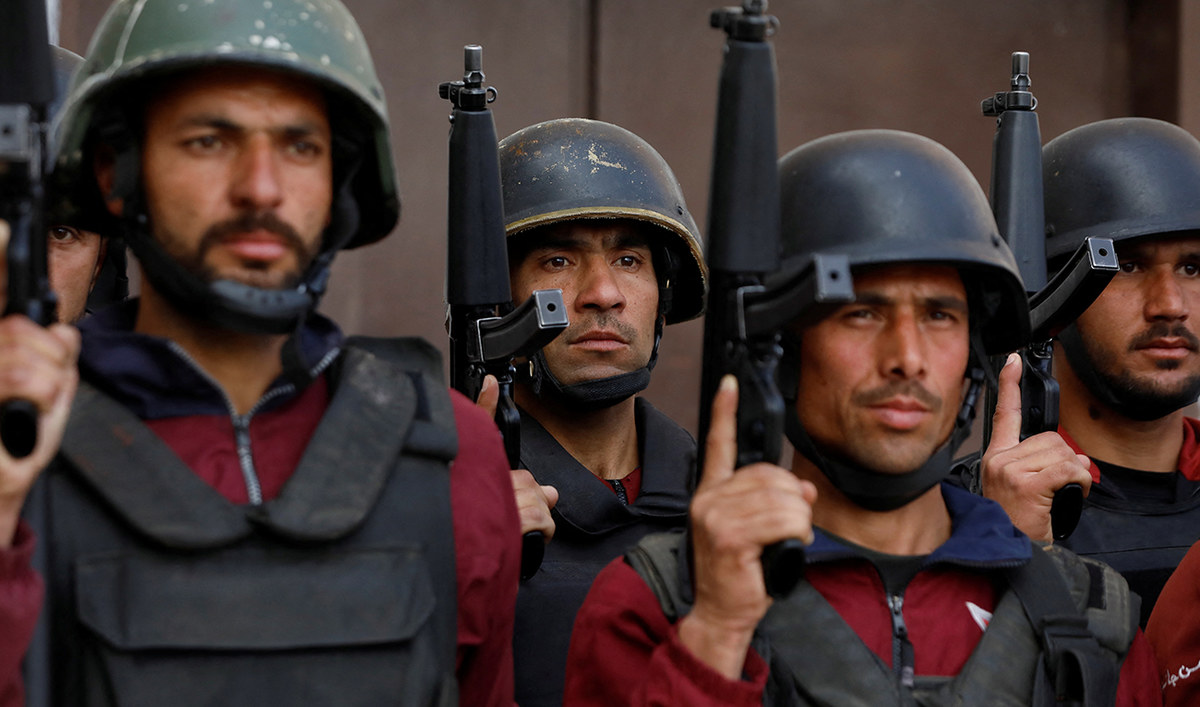
Police officers hold their weapons during a training session at the Elite Police Training Centre in Nowshera, Pakistan, February 10, 2023. (Photo courtesy: REUTERS)
'Sitting ducks'
The police in Khyber-Pakhtunkhwa, which neighbours Islamabad, say they are up for the fight, but point to a lack of resources.
"The biggest problem is the number of personnel, which is a little low," said Shah, of Sarband station, which has 55 people -- including drivers and clerks -- for the station and eight affiliated outposts. "This is a target area, and we're absolutely face-to-face with (the militants)."
Days before Reuters visited Sarband, a senior police official was ambushed and killed outside the station during a firefight with militants. The attack demonstrated the firepower of the insurgents, who, according to Shah, used thermal goggles to target the officer in darkness.
It wasn't the first time. About a year ago, the TTP released a video of its snipers using thermal imaging to take out unsuspecting security personnel.
Pakistan Defence Minister Khawaja Asif, who did not respond to a request for comment from Reuters about the insurgency, told local TV this month that militants saw the police as "soft targets" because their public-facing role made it easier to penetrate their facilities.
Zahid Hussain, a journalist and author of books on militancy, said the police were more vulnerable than the military, given their resources and training.
"I mean, they're sitting ducks there," Hussain said.
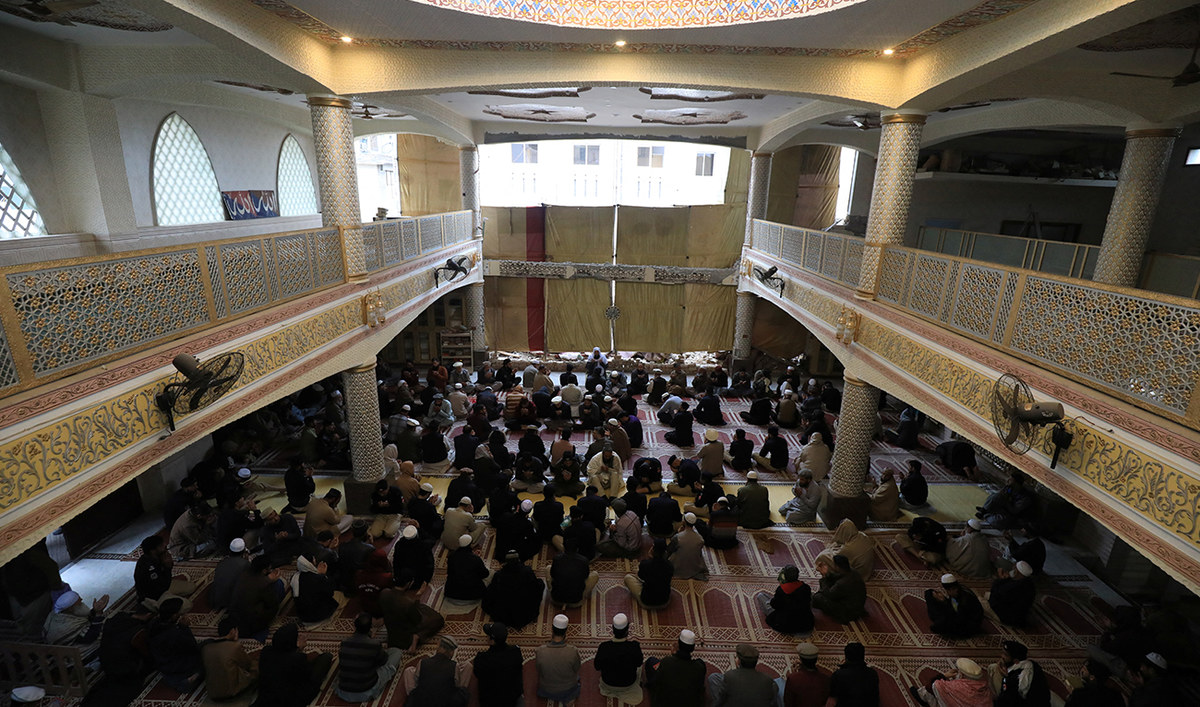
People pray for the victims who were killed in a suicide bombing in January, in a mosque that was partially damaged during the attack in the Police Lines area in Peshawar, Pakistan, February 9, 2023. (Photo courtesy: REUTERS)
'Lethal weapons'
Moazzam Jah Ansari, who was chief of Khyber-Pakhtunkhwa's police when he spoke to Reuters this month but has since been replaced, said militant strategies had been evolving.
"They try and find more effective ways to conduct military operations, more lethal weapons," he said.
Militants have procured U.S.-made M4 rifles and other sophisticated weapons from stocks left by Western forces that exited Afghanistan in 2021, police officials said. Some police guards told Reuters they had seen small reconnaissance drones flying over their outposts.
Khurasani, the TTP spokesman, confirmed that the group was using drones for surveillance.
Several police officials at Sarband station said the provincial government and military provided them and other outposts with thermal goggles in late January to aid the fight. But they encountered another problem.
"About 22 hours of the day we have power outages... there's no electricity to charge our goggles," Shah told Reuters at Sarband.
The station has one rooftop solar panel, which officers paid out of their own pockets to install, according to station chief Qayyum Khan. One policeman, who spoke on the condition of anonymity for fear of disciplinary action, said police use their vehicles or go to a petrol station equipped with a back-up generator to charge their goggles.
Police said they had taken other protection measures, including erecting rudimentary walls to guard against sniper fire, and procuring bulletproof glass from a market that sells equipment left behind by U.S.-led forces.
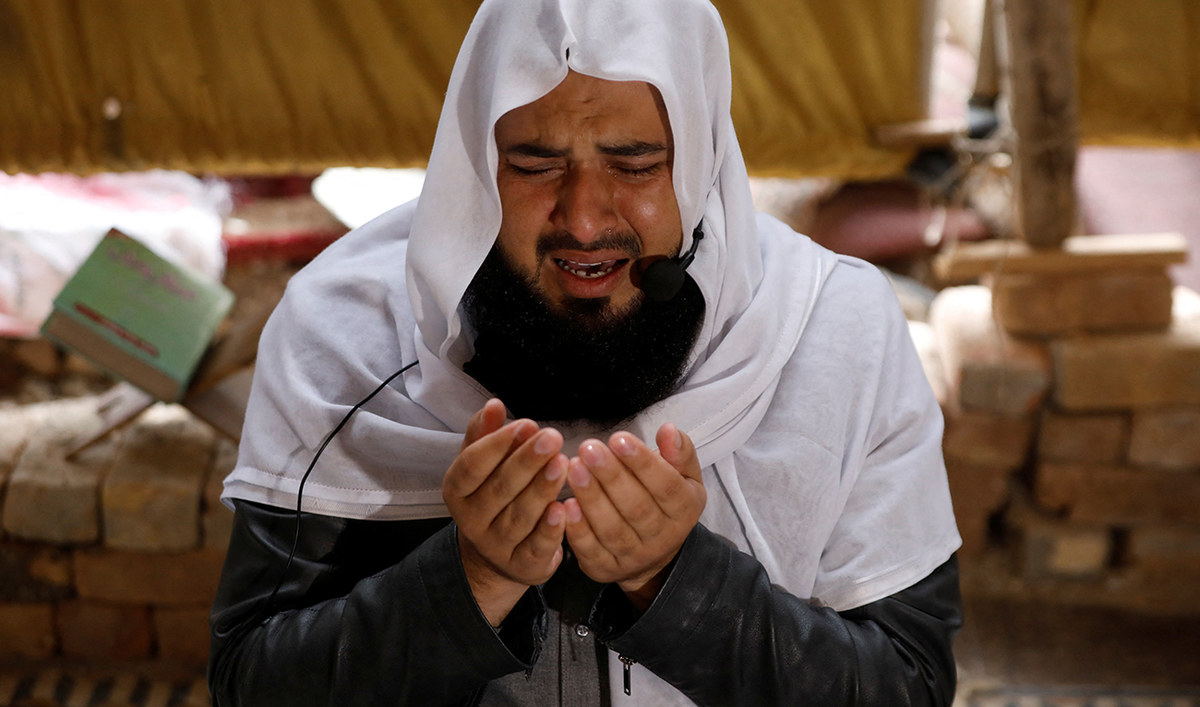
Imam Noor ul Ameen, 35, who is also a police employee, holds his palms as he leads a prayer for the victims who were killed in a suicide bombing in January, in a mosque that was partially damaged during the attack in the Police Lines area, in Peshawar, Pakistan, February 9, 2023. (Photo courtesy: REUTERS)
Economic conditions
Reuters spoke to four other senior officials and more than a dozen lower-ranking officers, all of whom said the provincial force was neglected despite its key role. They spoke on the condition of anonymity for fear of disciplinary action.
Required resources were not forthcoming, and their pay and perks were inferior to that of counterparts elsewhere in Pakistan, let alone the military, these officials told Reuters.
"Do the police need more resources? They absolutely do," said Taimur Jhagra, who was provincial finance minister until January, when a caretaker administration took over ahead of elections.
Jhagra said his government helped the police as much as it could with pay raises and procuring equipment such as goggles, despite fiscal constraints. Pakistan's debt-ridden economy has been in a tailspin for over a year, and the country is trying to slash spending to avoid default.
"Khyber-Pakhtunkhwa pays a greater price for that" because of its exposure to the militants, he said.
Ansari, the former police chief, said resources had improved, but tended to come reactively when a threat emerged, rather than as sustained support. He, too, attributed this to economic circumstances, but added that things were not as bad as some suggested.
'Seething anger'
After Western forces left Afghanistan in August 2021, Pakistan sought a truce with the TTP, resulting in a months-long ceasefire and negotiations brokered by the Afghan Taliban. As part of the effort, many militants from Afghanistan were resettled in Pakistan.
The TTP ended the ceasefire in November 2022, and regrouped militants restarted attacks in Pakistan soon after.
Following the Peshawar bombing, police personnel held public protests where some voiced anger against their leadership, the provincial and national governments, and even the military, calling for more resources and clarity on the policy of fighting the militants. Ansari acknowledged a "deep sense of loss" and "seething anger" in the force in the wake of the attack.
At the site of the blast, police personnel gathered on a recent day to remember their fallen comrades. The imam, a police employee who lost his brother in the attack, prayed for the success of the force.
Behind the mosque, Daulat Khan, an assistant sub-inspector, and eight relatives live in cramped police quarters comprising a 25-square-metre space with only one room. Around him are crumbling, blast-damaged walls.
"Everyone can see the sacrifices of the police, but nothing is done for us," he said, pointing to rows of century-old, British-colonial era quarters. "You see the conditions in front of you."
Outside, open sewage canals lined the alleyways.
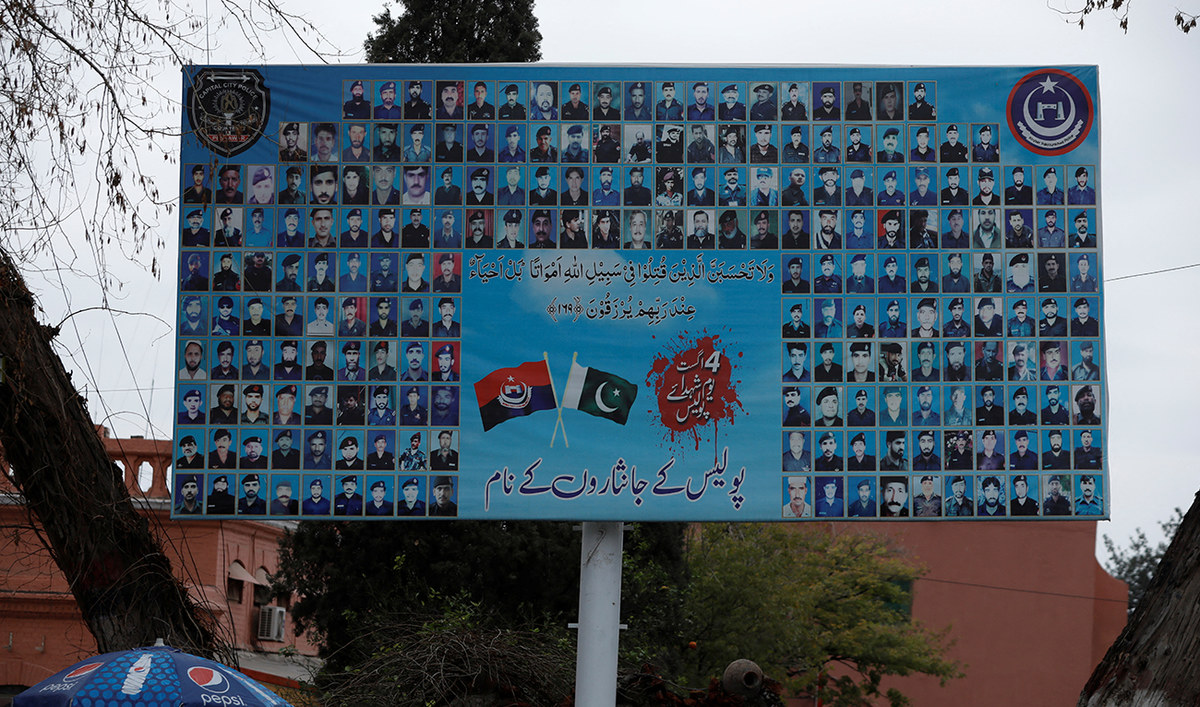
A billboard with photos of police officers who died in the line of duty is seen in the Police Lines area, Peshawar, Pakistan, February 9, 2023. (Photo courtesy: REUTERS)
Different battle
Pakistan's military effectively dismantled the TTP and killed most of its top leadership in a string of operations from 2014 onwards, driving most of the fighters into Afghanistan, where they regrouped.
But the nature of the fight has changed in recent months, which partly shows why the police, not the military, are at the forefront. The militants were now spread in smaller groups across the country and among the civilian population, instead of operating from bases in former tribal areas, analysts said.
The military has also been stretched by another insurgency in the southwestern province of Balochistan, where separatists are targeting state infrastructure and Chinese investments.
The defence ministry did not respond to requests for comment about the armed forces' role in resisting militants in Khyber-Pakhtunkhwa.
Miles from the flashpoints, meanwhile, police graduates receive six-month crash courses in anti-militant operations at the vast Elite Police Training Centre in Nowshera.
The personnel, including women, learn how to conduct raids, rappel from buildings and use rocket-propelled grenades and anti-aircraft guns, which they unleash on a model of a militant training camp.
But beyond the training school's walls, there is no stationary militant camp, attacks come at night, and police are often on their own.
Faizanullah Khan said that, on some nights at his outpost, militants call out to him or his fellow guards. "They say 'we see you; lay down your arms'," he said.
The guards sometimes reply, he said, by firing their guns into the darkness.














